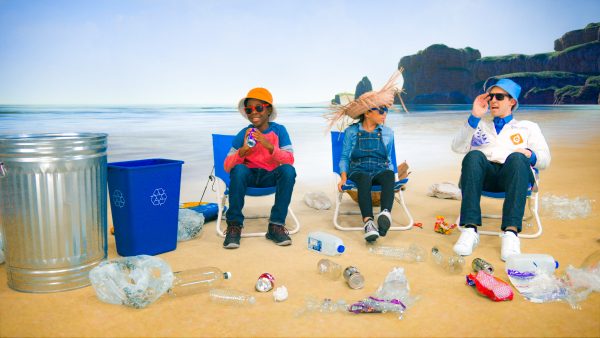Recycle Definition
Recycling turns old items into new ones. For example, using old bottles to make new ones lessens trash in landfills.
View Lesson on Reducing Our Impact on Earth
Become a member to get full access to our entire library of learning videos, reading material, quiz games, simple DIY activities & more.
Become a member to get full access to our entire library of learning videos, quiz games, & more.
Plans & Pricingto watch this full video.

Access All Videos
and Lessons, No Limits.
Access All Videos

No credit card required,
takes 7 sec to signup.
No card required

Ready-to-go lessons
that save you time.
Ready-to-go lessons
If you are on a school computer or network, ask your tech person to whitelist these URLs:
*.wistia.com, fast.wistia.com, fast.wistia.net, embedwistia-a.akamaihd.net
Sometimes a simple refresh solves this issue. If you need further help, contact us.
Reducing Our Impact on Earth
Fun Facts
- Aluminum cans are recycled by melting into liquid metal for new cans.
- Recycled newspapers can be used to make a bowl.
- Plates can be made from recycled paper.
Why Do We Need To Know About Recycle
Learning about recycling helps you see why it’s important to be eco-friendly. Recycling saves natural resources, needs less space for trash, cuts down pollution, and uses less energy. This is really important for jobs in making things and protecting the environment. How we use materials and handle waste affects our planet.
Recycling is important in making new things from old materials and coming up with products that are better for the earth. This is a big deal in many industries. Knowing how recycling works can prepare you for jobs that help make our future more environmentally friendly.
Frequently Asked Questions
Check out the Full Lesson on Reducing Our Impact on Earth
In this lesson, we learn that:
- We will learn to reduce, reuse and recycle.
- People can have a negative impact on Earth's land, water and air.
- People can also make a positive impact through choices we make.
Related Topics
- Atom Definition
- Biotechnology Definition
- Carnivore Definition
- Chemical Reaction Definition
- Circulatory System Definition
- Competition Definition
- Condensation Definition
- Corona Definition
- DNA Definition
- Definition Of Evidence
- Definition Of Force
- Definition Of Living Things
- Definition Of Nutrients
- Digestive System Definition
- Dissolve Definition
- Earth’s Axis Definition
- Earthquake Definition
- Electricity Definition
- Element Definition
- Energy Conversion Definition
- Engineering Design Process Definition
- Fertilizer Definition
- Frequency Definition
- Germination Definition
- Insulator Definition
- Internal Structures Definition
- Lever Definition
- Light Reflection Definition
- Mold Fossils Definition
- Multicellular Definition
- Newton’s 2nd Law Of Motion Definition
- Ocean Current Definition
- Parasitism Definition
- Pollination Definition
- Pollution Definition
- Rain Gauge Definition
- Recycle Definition
- Renewable Energy Definition
- Scientist Definition
- Senses Definition
- Smelling Definition
- Solubility Definition
- Sun Definition
- Taxonomy Definition
- Volcano Definition
- Water Distribution Definition
- Water Quality Definition
- Weather Definition
Start a Free Trial Today. Get a $5 Amazon Gift Card!
Teachers! Start a free trial & we'll send your gift card within 1 day. Only cards left. Try it now.
Select Grade
Select Subject
This email is associated with a Science Kit subscription. Kit subscriptions are managed on this separate page: Manage Subscription

-
Download InvoiceScience & Math$/yr
-
Download InvoiceScience Only$/yr

access all lessons
• No credit card required •
"My students loved the videos. I started the video subscription in May and used them as a review before the state test, which I know contributed to 100% of my class passing the state test."
Rhonda Fox 4th Grade Teacher, Ocala, Florida
• No credit card required •
"My students loved the videos. I started the video subscription in May and used them as a review before the state test, which I know contributed to 100% of my class passing the state test."
Rhonda Fox 4th Grade Teacher, Ocala, Florida
• No credit card required •
Already a member? Sign In
* no credit card required *

* no credit card required *
* no credit card required *


no credit card required
Skip, I will use a 3 day free trial
Enjoy your free 30 days trial
-
Unlimited access to our full library
of videos & lessons for grades K-5. -
You won’t be billed unless you keep your
account open past your 14-day free trial. -
You can cancel anytime in 1 click on the
manage account page or by emailing us.
-
Unlimited access to our full library of videos & lessons for grades K-5.
-
You won't be billed unless you keep your account open past 14 days.
-
You can cancel anytime in 1-click on the manage account page.
Cancel anytime in 1-click on the manage account page before the trial ends and you won't be charged.
Otherwise you will pay just $10 CAD/month for the service as long as your account is open.
Cancel anytime on the manage account page in 1-click and you won't be charged.
Otherwise you will pay $10 CAD/month for the service as long as your account is open.
We just sent you a confirmation email. Enjoy!
DoneWe use cookies to make your experience with this site better. By using this site you agree to our use of cookies. Click "Decline" to delete and block any non-essential cookies for this site on this specific property, device, and browser. Please read our privacy policy for more information on the cookies we use.Learn More
We use cookies to improve your experience. By using this site, you agree to our use of cookies. Click "Decline" to block non-essential cookies. See our privacy policy for details.Learn More




























































































































